- Home
- Robert Graves
The Greek Myths, Volume2 Page 8
The Greek Myths, Volume2 Read online
Page 8
g. In the eighth year – or, according to some, after a passage of twenty years – Orestes secretly returned to Mycenae, by way of Athens, determined to destroy both Aegisthus and his own mother.13
One morning, with Pylades at his side, he visited Agamemnon’s tomb and there, cutting off a lock of his hair, he invoked Infernal Hermes, patron of fatherhood. When a group of slave-women approached, dirty and dishevelled for the purposes of mourning, he took shelter in a near-by thicket to watch them. Now, on the previous night, Clytaemnestra had dreamed that she gave birth to a serpent, which she wrapped in swaddling clothes and suckled. Suddenly she screamed in her sleep, and alarmed the whole Palace by crying that the serpent had drawn blood from her breast, as well as milk. The opinion of the soothsayers whom she consulted was that she had incurred the anger of the dead; and these mourning slave-women consequently came on her behalf to pour libations upon Agamemnon’s tomb, in the hope of appeasing his ghost. Electra, who was one of the party, poured the libations in her own name, not her mother’s; offered prayers to Agamemnon for vengeance, instead of pardon; and bade Hermes summon Mother Earth and the gods of the Underworld to hear her plea. Noticing a ringlet of fair hair upon the tomb, she decided that it could belong only to Orestes: both because it closely resembled her own in colour and texture, and because no one else would have dared to make such an offering.14
h. Torn between hope and doubt, she was measuring her feet against Orestes’s foot-prints in the clay beside the tomb, and finding a family resemblance, when he emerged from his hiding place, showed her that the ringlet was his own, and produced the robe in which he had escaped from Mycenae.
Electra welcomed him with delight, and together they invoked their ancestor, Father Zeus, whom they reminded that Agamemnon had always paid him great honour and that, were the House of Atreus to die out, no one would be left in Mycenae to offer him the customary hecatombs: for Aegisthus worshipped other deities.15
i. When the slave-women told Orestes of Clytaemnestra’s dream, he recognized the serpent as himself, and declared that he would indeed play the cunning serpent and draw blood from her false body. Then he instructed Electra to enter the Palace and tell Clytaemnestra nothing about their meeting; he and Pylades would follow, after an interval, and beg hospitality at the gate, as strangers and suppliants, pretending to be Phocians and using the Parnassian dialect. If the porter refused them admittance, Aegisthus’s inhospitality would outrage the city; if he granted it, they would not fail to take vengeance.
Presently Orestes knocked at the Palace gate, and asked for the master or mistress of the house. Clytaemnestra herself came out, but did not recognize Orestes. He pretended to be an Aeolian from Daulis, bearing sad news from one Strophius, whom he had met by chance on the road to Argos: namely, that her son Orestes was dead, and that his ashes were being kept in a brazen urn. Strophius wished to know whether he should send these back to Mycenae, or bury them at Crisa.16
j. Clytaemnestra at once welcomed Orestes inside and, concealing her joy from the servants, sent his old nurse, Geilissa, to fetch Aegisthus from a near-by temple. But Geilissa saw through Orestes’s disguise and, altering the message, told Aegisthus to rejoice because he could now safely come alone and weaponless to greet the bearers of glad tidings: his enemy was dead.17
Unsuspectingly, Aegisthus entered the Palace where, to create a further distraction, Pylades had just arrived, carrying a brazen urn. He told Clytaemnestra that it held Orestes’s ashes, which Strophius had now decided to send to Mycenae. This seeming confirmation of the first message put Aegisthus completely off his guard; thus Orestes had no difficulty in drawing his sword and cutting him down. Clytaemnestra then recognized her son, and tried to soften his heart by baring her breast, and appealing to his filial duty; Orestes, however, beheaded her with a single stroke of the same sword, and she fell beside the body of her paramour. Standing over the corpses, he addressed the Palace servants, holding aloft the still blood-stained net in which Agamemnon had died, eloquently exculpating himself for the murder of Clytaemnestra by this reminder of her treachery, and adding that Aegisthus had suffered the sentence prescribed by law for adulterers.18
k. Not content with killing Aegisthus and Clytaemnestra, Orestes next disposed of the second Helen, their daughter; and Pylades beat off the sons of Nauplius, who had come to Aegisthus’s rescue.19
l. Some say, however, that these events took place in Argos, on the third day of Hera’s Festival, when the virgins’ procession was about to begin. Aegisthus had prepared a banquet for the Nymphs near the horse-meadows, before sacrificing a bull to Hera, and was gathering myrtle-boughs to wreathe his head. It is added that Electra, meeting Orestes by Agamemnon’s tomb, would not believe at first that he was her long-lost brother, despite the similarity of their hair, and the robe he showed her. Finally, a scar on his forehead convinced her; because once, when they were children together, chasing a deer, he had slipped and fallen, cutting his head upon a sharp rock.
m. Obeying her whispered instructions, Orestes went at once to the altar where the bull had now been slaughtered and, as Aegisthus bent to inspect its entrails, struck off his head with the sacrificial axe. Meanwhile, Electra, to whom he presented the head, enticed Clytaemnestra from the palace by pretending that, ten days before, she had borne a son to her peasant husband; and when Clytaemnestra, anxious to inspect her first grand-child, visited the cottage, Orestes was waiting behind the door and killed her without mercy.20
n. Others, though agreeing that the murder took place at Argos, say that Clytaemnestra sent Chrysothemis to Agamemnon’s tomb with the libations, having dreamed that Agamemnon, restored to life, snatched his sceptre from Aegisthus’s hands and planted it so firmly in the ground that it budded and put forth branches, which overshadowed the entire land of Mycenae. According to this account, the news which deceived Aegisthus and Clytaemnestra was that Orestes had been accidentally killed while competing in the chariot race at the Pythian Games; and that Orestes showed Electra neither a ringlet nor an embroidered robe, nor a scar, in proof of his identity, but Agamemnon’s own seal, which was carved from a piece of Pelops’s ivory shoulder.21
o. Still others, denying that Orestes killed Clytaemnestra with his own hands, say that he committed her for trial by the judges, who condemned her to death, and that his one fault, if it may be called a fault, was that he did not intercede on her behalf.22
1. Euripides: Orestes 462 and Iphigeneia in Aulis 622.
2. Aeschylus: Agamemnon 877 ff. and Libation-bearers 732; Euripides: Electra 14 ff.; Pindar: Pythian Odes xi. 17, with scholiast.
3. Apollodorus: Epitome vi. 24; Euripides: loc. cit. and 542 ff.; Aeschylus: Libation-bearers 232.
4. Euripides: Electra 409–12; Sophocles: Electra 11 ff.; Pindar: Pythian Odes xi. 34–6.
5. Hyginus: Fabula 117; Scholiast on Euripides’s Orestes 33, 764, and 1235; Euripides: Iphigeneia Among the Taurians 921; Apollodorus: Epitome vi. 24; Ovid: Pontic Epistles iii. 2.95–8.
6. Euripides: Electra 289 and 323–5; Aeschylus: Libation-bearers 431.
7. Homer: Odyssey iii. 305; Euripides: Electra 320 ff. and 931 ff.; Sophocles: Electra 267 ff. and 651.
8. Euripides: Electra 33, 320 ff. and 617 ff; Hyginus: Fabula 119.
9. Euripides: Electra 19 ff., 253 ff., and 312 ff.
10. Hyginus: Fabula 122; Ptolemy Hephaestionos: iv, quoted by Photius p. 479; Euripides: Electra 60–4; Aeschylus: Libation-bearers 130 ff; Sophocles: Electra 341 ff, 379 ff. and 516 ff.
11. Apollodorus: Epitome vi. 24; Aeschylus: Eumenides 622 and Libation-bearers 269 ff.
12. Sophocles: Electra 36–7 and 51–2; Euripides: Orestes 268–70; Aeschylus: Libation-bearers 1038.
13. Homer: Odyssey iii. 306 ff.; Hypothesis of Sophocles’s Electra; Apollodorus: Epitome vi. 25.
14. Aeschylus: Libation-bearers.
15. Aeschylus: ibid.
16. Aeschylus: ibid.
17. Aeschylus: ibid.
18. Hyginus: Fab
ula 119; Aeschylus: Eumenides 592 and Libation-bearers 973 ff.
19. Ptolemy Hephaestionos: iv, quoted by Photius p. 479; Pausanias: i. 22. 6.
20. Euripides: Electra.
21. Sophocles: Electra 326 and 417 ff.; 47–50 and 1223, with scholiast.
22. Servius on Virgil’s Aeneid xi. 268.
1. This is a crucial myth with numerous variants. Olympianism had been formed as a religion of compromise between the pre-Hellenic matriarchal principle and the Hellenic patriarchal principle; the divine family consisting, at first, of six gods and six goddesses. An uneasy balance of power was kept until Athene was reborn from Zeus’s head, and Dionysus, reborn from his thigh, took Hestia’s seat at the divine Council (see 27. k); thereafter male preponderance in any divine debate was assured – a situation reflected on earth – and the goddesses’ ancient prerogatives could now be successfully challenged.
2. Matrilinear inheritance was one of the axioms taken over from the pre-Hellenic religion. Since every king must necessarily be a foreigner, who ruled by virtue of his marriage to an heiress, royal princes learned to regard their mother as the main support of the kingdom, and matricide as an unthinkable crime. They were brought up on myths of the earlier religion, according to which the sacred king had always been betrayed by his goddess-wife, killed by his tanist, and avenged by his son; they knew that the son never punished his adulterous mother, who had acted with the full authority of the goddess whom she served.
3. The antiquity of the Orestes myth is evident from his friendship for Pylades, to whom he stands in exactly the same relation as Theseus to Peirithous. In the archaic version, he was doubtless a Phocian prince who ritually killed Aegisthus at the close of the eighth year of his reign, and became the new king by marriage to Chrysothemis, Clytaemnestra’s daughter.
4. Other tell-tale traces of the archaic version persist in Aeschylus, Sophocles, and Euripides. Aegisthus is killed during the festival of the Death-goddess Hera, while cutting myrtle-boughs; and despatched, like the Minos bull, with a sacrificial axe. Geilissa’s rescue of Orestes (‘mountaineer’) in a robe ‘embroidered with wild beasts’, and the tutor’s stay among the shepherds of Tanus, together recall the familiar tale of a royal prince who is wrapped in a robe, left ‘on a mountain’ to the mercy of wild beasts, and cared for by shepherds – the robe being eventually recognized, as in the Hippothous myth (see 49. a). Geilissa’s substitution of her own son for the royal victim refers, perhaps, to a stage in religious history when the king’s annual child-surrogate was no longer a member of the royal clan.
5. How far, then, can the main features of the story, as given by the Attic dramatists, be accepted? Though it is improbable that the Erinnyes have been wantonly introduced into the myth – which, like that of Alcmaeon and Eriphyle (see 107. d), seems to have been a moral warning against the least disobedience, injury, or insult that a son might offer his mother – yet it is equally improbable that Orestes killed Clytaemnestra. Had he done so, Homer would certainly have mentioned the fact, and refrained from calling him ‘god-like’; he records only that Orestes killed Aegisthus, whose funeral feast he celebrated jointly with that ofhis hateful mother (Odyssey iii. 306 ff.). The Parian Chronicle, similarly, makes no mention of matricide in Orestes’s indictment. It is probable therefore that Servius has preserved the true account: how Orestes, having killed Aegisthus, merely handed over Clytaemnestra to popular justice – a course significantly recommended by Tyndareus in Euripides’s Orestes (496 ff.). Yet to offend a mother by a refusal to champion her cause, however wickedly she had behaved, sufficed under the old dispensation to set the Erinnyes on his track.
6. It seems, then, that this myth, which was of wide currency, had placed the mother of a household in so strong a position, when any family dispute arose, that the priesthood of Apollo and of Zeus-born Athene (a traitress to the old religion) decided to suppress it. They did so by making Orestes not merely commit Clytaemnestra to trial, but kill her himself, and then secure an acquittal in the most venerable court of Greece: with Zeus’s support, and the personal intervention of Apollo, who had similarly encouraged Alcmaeon to murder his treacherous mother Eriphyle. It was the priests’ intention, once and for all, to invalidate the religious axiom that motherhood is more divine than fatherhood.
7. In the revision patrilocal marriage and patrilinear descent are taken for granted, and the Erinnyes are successfully defied. Electra, whose name, ‘amber’, suggests the paternal cult of Hyperborean Apollo, is favourably contrasted with Chrysothemis, whose name is a reminder that the ancient concept of matriarchal law was still golden in most parts of Greece, and whose ‘subservience’ to her mother had hitherto been regarded as pious and noble. Electra is ‘all for the father’, like the Zeus-born Athene. Moreover, the Erinnyes had always acted for the mother only; and Aeschylus is forcing language when he speaks of Erinnyes charged with avenging paternal blood (Libation-bearers 283–4). Apollo’s threat of leprosy if Orestes did not kill his mother, was a most daring one: to inflict, or heal, leprosy had long been the sole prerogative of the White Goddess Leprea, or Alphito (White Goddess, Chapter 24). In the sequel, not all the Erinnyes accept Apollo’s Delphic ruling, and Euripedes appeases his female audience by allowing the Dioscuri to suggest that Apollo’s injunctions had been most unwise (Electra 1246).
8. The wide variations in the recognition scene, and in the plot by which Orestes contrives to kill Aegisthus and Clytaemnestra, are of interest only as proving that the Classical dramatists were not bound by tradition. Theirs was a new version of an ancient myth; and both Sophocles and Euripides tried to improve on Aeschylus, who first formulated it, by making the action more plausible.
114
THE TRIAL OF ORESTES
THE Mycenaeans who had supported Orestes in his unheard-of action would not allow the bodies of Clytaemnestra and Aegisthus to lie within their city, but buried them at some distance beyond the walls.1 That night, Orestes and Pylades stood guard at Clytaemnestra’s tomb, lest anyone should dare rob it; but, during their vigil, the serpent-haired, dog-headed, bat-winged Erinnyes appeared, swinging their scourges. Driven to distraction by these fierce attacks, against which Apollo’s bow of horn was of little avail, Orestes fell prostrate on a couch, where he lay for six days, his head wrapped in a cloak – refusing either to eat or to wash.
b. Old Tyndareus now arrived from Sparta, and brought a charge of matricide against Orestes, summoning the Mycenaean chieftains to judge his case. He decreed that, pending the trial, none should speak either to Orestes or Electra, and that both should be denied shelter, fire, and water. Thus Orestes was prevented even from washing his blood-stained hands. The streets of Mycenae were lined with citizens in arms; and Oeax, son of Nauplius, delighted in this opportunity to persecute Agamemnon’s children.2
c. Meanwhile, Menelaus, laden with treasure, landed at Nauplia, where a fisherman told him that Aegisthus and Clytaemnestra had been murdered. He sent Helen ahead to confirm the news at Mycenae; but by night, lest the kinsmen of those who had perished at Troy should stone her. Helen, feeling ashamed to mourn in public for her sister Clytaemnestra, since she herself had caused even more bloodshed by her infidelities, asked Electra, who was now nursing the afflicted Orestes: ‘Pray, niece, take offerings of my hair and lay them on Clytaemnestra’s tomb, after pouring libations to her ghost.’ Electra, when she saw that Helen had been prevented by vanity from cutting off more than the very tips of her hair, refused to do so. ‘Send your daughter Hermione instead,’ was her curt advice. Helen thereupon summoned Hermione from the palace. She had been only a nine-year-old child when her mother eloped with Paris, and Menelaus had committed her to Clytaemnestra’s charge at the outbreak of the Trojan War; yet she recognized Helen at once and dutifully went off to do as she was told.3
d. Menelaus then entered the palace, where he was greeted by his foster-father Tyndareus, clad in deep mourning, and warned not to set foot on Spartan soil until he had punished his criminal nephew and niece.
Tyndareus held that Orestes should have contented himself with allowing his fellow-citizens to banish Clytaemnestra. If they had demanded her death he should have interceded on her behalf. As matters now stood, they must be persuaded, willy-nilly, that not only Orestes, but Electra who had spurred him on, should be stoned to death as matricides.
e. Fearing to offend Tyndareus, Menelaus secured the desired verdict. But at the eloquent plea of Orestes himself, who was present in court and had the support of Pylades (now disowned by Strophius for his part in the murder), the judges commuted the sentence to one of suicide. Pylades then led Orestes away, nobly refusing to desert either him or Electra, to whom he was betrothed; and proposed that, since all three must die, they should first punish Menelaus’s cowardice and disloyalty by killing Helen, the originator of every misfortune that had befallen them. While, therefore, Electra waited outside the walls to execute her own design – that of intercepting Hermione on her return from Clytaemnestra’s tomb and holding her as a hostage for Menelaus’s good behaviour – Orestes and Pylades entered the palace, with swords hidden beneath their cloaks, and took refuge at the central altar, as though they were suppliants. Helen, who sat near by, spinning wool for a purple robe to lay as a gift on Clytaemnestra’s tomb, was deceived by their lamentations, and approached to welcome them. Whereupon both drew their swords and, while Pylades chased away Helen’s Phrygian slaves, Orestes attempted to murder her. But Apollo, at Zeus’s command, rapt her in a cloud to Olympus, where she became an immortal; joining her brothers, the Dioscuri, as a guardian of sailors in distress.4
f. Meanwhile, Electra had secured Hermione, led her into the palace, and barred the gates. Menelaus, seeing that death threatened his daughter, ordered an immediate rescue. His men burst open the gates, and Orestes was just about to set the palace alight, kill Hermione, and die himself either by sword or fire, when Apollo providentially appeared, wrenched the torch from his hand, and drove back Menelaus’s warriors. In the awed hush caused by his presence, Apollo commanded Menelaus to take another wife, betroth Hermione to Orestes, and return to rule over Sparta; Clytaemnestra’s murder need no longer concern him, now that the gods had intervened.5

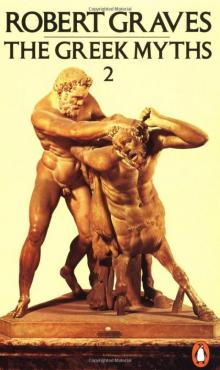 The Greek Myths, Volume2
The Greek Myths, Volume2 The Anger of Achilles: Homer's Iliad
The Anger of Achilles: Homer's Iliad Count Belisarius
Count Belisarius The Twelve Caesars
The Twelve Caesars Complete Poems 3 (Robert Graves Programme)
Complete Poems 3 (Robert Graves Programme) Homer's Daughter
Homer's Daughter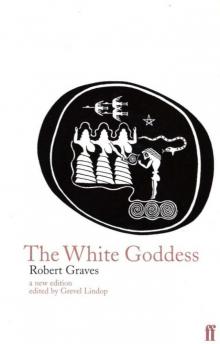 The White Goddess
The White Goddess Goodbye to All That
Goodbye to All That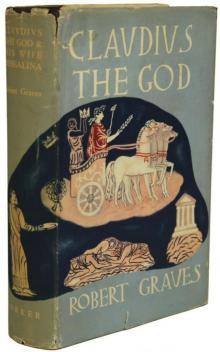 Claudius the God and His Wife Messalina
Claudius the God and His Wife Messalina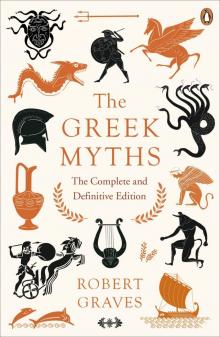 The Greek Myths
The Greek Myths I, Claudius
I, Claudius The Islands of Unwisdom
The Islands of Unwisdom Complete Short Stories
Complete Short Stories The Golden Fleece
The Golden Fleece They Hanged My Saintly Billy
They Hanged My Saintly Billy King Jesus
King Jesus Sergeant Lamb's America
Sergeant Lamb's America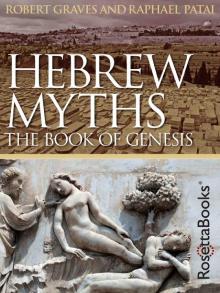 Hebrew Myths: The Book of Genesis
Hebrew Myths: The Book of Genesis Seven Days in New Crete
Seven Days in New Crete Proceed, Sergeant Lamb
Proceed, Sergeant Lamb Claudius the God
Claudius the God Wife to Mr. Milton
Wife to Mr. Milton The Complete Poems
The Complete Poems The Anger of Achilles
The Anger of Achilles Claudius the God c-2
Claudius the God c-2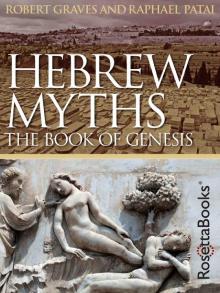 Hebrew Myths
Hebrew Myths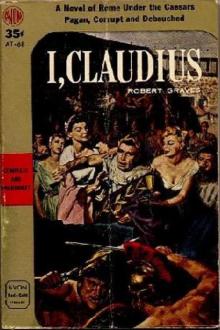 I, Claudius c-1
I, Claudius c-1 The Greek Myths, Volume 1
The Greek Myths, Volume 1